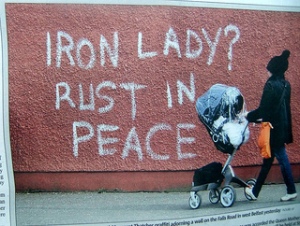 Margeret Thatcher’s Leadership Style
Margeret Thatcher’s Leadership Style
As up to 2,000 of the world’s past and present movers and shakers attended Margaret Thatcher’s funeral – one question remained. How will Margaret Thatcher’s leadership style be remembered?
It’s fair to say that opinion is as divided now as it was during the years of her premiership (1979 – 1990). Her death set twitter and Facebook alight. Those who had suffered (or whose parents had) are vehement in their stance. For others, Margaret Thatcher was held up as the type of leader this country badly needs today. So how do we measure good leadership styles?
Leaders lead
The very definition of a leader is that they gain a following. She won the general election in 1979 and in the process took the battle to the unions who held such sway over the country, and won. Not that winning won her many friends, she was a hugely unpopular prime minister. The Argentines thought they could take advantage and invaded the Falklands. Never one to back down, Thatcher’s resoluteness beat the Argentinians and turned around her popularity in the process.
In that sense Margeret Thatcher’s leadership style was very much in the “hero” mold. Like a World War 1 general barking instructions. Because she believed she was always right, she didn’t worry about gaining buy-in from others. She blazed a trail and demanded others follow. It was this approach that was her greatest strength, but also her greatest weakness.
If Margeret Thatcher’s leadership style has been more inclusive or empathetic maybe her cabinet would not have made it known her approach was antiquated and could not be tolerated any more. From a psychological perspective it’s interesting that her successor was as opposite to Thatcher as it’s possible to be (compare “Iron Lady” with “Mr Grey”). Even the country approved the change in leadership style as they voted for John Major at the next election too.
Leaders believe
The best leaders transform and gain buy in from followers by having utter confidence in their view of what can be. They have an innate ability to communicate vision resulting in very high followership. Some do this via non aggressive behaviours (Mahatma Ghandi, Martin Luther King), some by acting in very narcissist ways promising heaven on earth (literally in some cases) based on highly charismatic personalities (Enron, most if not all sects).
Thatcher’s leadership style was highly influenced by her father and her upbringing as a shop keeper. Those who can do should be helped to do so. “I came to office with one deliberate intent: to change Britain from a dependent to a self-reliant society — from a give-it-to-me, to a do-it-yourself nation. A get-up-and-go, instead of a sit-back-and-wait-for-it Britain.” (1)
This formed the basis of her tenure, and caused such uproar as she sought to remove what she saw as antiquated suppressing bodies stifling the common man. Her stance with the European Union is a perfect example of resisting increased regulation/control from others. Privatisation became the watch word (2).
Leaders connect
Here is perhaps the area which causes such divided opinion on Thatcher. Good long term leadership styles mean connecting deeply with followers. The result is followers often come to use the same language, the same metaphors and believe the same things as the leader. A great leader will personify the values and needs of the followers – and as such there is a question whether the leader leads the followers, or the followers lead the leader.
Could these descriptions be used of Margaret Thatcher’s leadership style? Did Thatcher personify the values of the nation? Or did she act out of her own viewpoint and demand everyone else follow? Interesting parallels could be drawn with Steve Jobs who had in mind what was needed, and pursued his goal with unrelenting drive.
During the significant economic growth phase of the late 1980s Thatcher gained many supporters. The financial industry for one was delighted with the huge salaries and cash bonuses that came about due to deregulation and focus on improving one’s lot in life. Yet at the same time the gap between rich and poor grew very quickly. And herein lies the issue.
Thatcher’s leadership style was supported by those who were able to take advantage, but loathed by those who either weren’t or abjectly refused to become part of what they saw as a greed (City) culture.
Thatcher’s Leadership Styles Summary
The impact Margaret Thatcher had on the UK was significant. This is mirrored by the fact that Big Ben did not strike during her funeral – the first time since Winston Churchill’s funeral sixty years earlier. Radio, twitter, blogs, twitter, TV, newspapers, magazines had their say.
Talking with a therapist friend whilst watching the film Iron Lady, we both commented how amazing it would have been to work with Thatcher as a leadership coach. Is it possible that the leadership styles she adopted would have been modified as her awareness increased? Awareness of how she led, communicated and related? Would her legacy have been much different? Would the country have been so divided?
I welcome your thoughts, please comment!
Author: Mark Bateman, 17th April 2013. Image Gwydion M. Williams
References
(1) Speech to Small Business Bureau Conference (8 February, 1984)
(2) Privatisation quote – Conservative Party Conference (10 October, 1986)
Many more quotes at wikiquotes http://en.wikiquote.org/wiki/Margaret_Thatcher
Mark Bateman works as a Leadership Coach at Welcome Insight. We work with leaders helping them to develop and sharpen their leadership skills whilst building more effective organisations.


